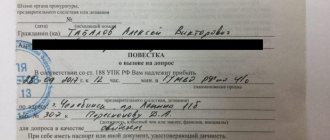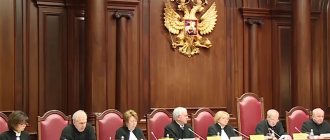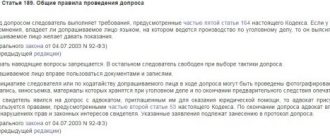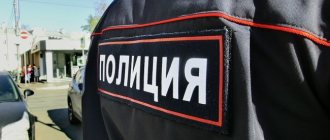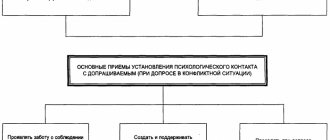A minor under 16 years of age can be summoned for questioning through his parents or educational institution. Notification of the interrogation may come in the form of a summons or by telephone. The agenda will display two names: the child's and the adult's.
If you believe that your child may be in danger, be sure to send him or her for questioning to a qualified defense lawyer - a juvenile defense lawyer.
Do you want to figure it out, but don’t have time to read the article? Lawyers will help
Entrust the task to professionals. Lawyers will complete the order at the cost you specify
63 lawyers on RTIGER.com can help with this issue
Solve the issue >
How is the interrogation going?
In order for the interrogation of a minor to be most effective, it is important to pay attention to the location and preparation. The investigator faces a number of questions:
- Where is it better to conduct the interrogation - at the place of investigation or in an environment familiar to the child. When resolving this issue, they take into account the age of the minor. For kids, familiar surroundings are preferred, and for teenagers from 14 to 16 years old, the opposite is true. In some situations, questioning at the scene of an incident is acceptable: this is done after a significant amount of time has passed after the event or to establish precise details.
- Choose a day and time for the interrogation. Due to the peculiarities of the child’s psyche, the interrogation should be carried out as soon as possible. The impressions of the incident are superimposed on new events, which over time displace past, and especially unpleasant, memories from memory. It is also important that the child does not succumb to the influence of an adult who benefits from distorting the event.
- Make a psychological portrait of a minor. In order to establish psychological contact with a teenager, the investigator can communicate with parents and teachers before the interrogation. Find out your social circle and interests.
In terms of preparing to interview a minor, it is important that the investigator plan his or her time. It is unacceptable for a child to wait in the corridor.
The law sets limits on the time of interrogation. A teenager over the age of 14 cannot be interrogated for more than 4 hours a day. A child under seven years of age cannot be interrogated without a break for more than 30 minutes, or for a total of more than one hour. A child aged seven to fourteen years is allowed to be interrogated for an hour, and with a break - no more than two hours.
The information obtained during the interrogation is recorded in the protocol. At the end of the interrogation, all participants in the interrogation have the right to familiarize themselves with the document and make changes. The procedure itself should be recorded on video, but if the child or parent refuses, this will not happen.
Interrogation of a minor victim or witness
Article 191 of the Code of Criminal Procedure of the Russian Federation is devoted to the rules that must be followed when interrogating a minor. Legal requirements:
- The presence of a teacher for minors under 14 years of age, and from 14 years of age is at the discretion of the investigator.
- Presence of parents. For children under 14 years of age this is a mandatory requirement. Moreover, if a child is a victim of domestic violence, then the presence of parents is prohibited. Then another relative or representative of the educational institution is called.
Example. Single mother Galina Skvortsova is raising her nine-year-old daughter Natalya. Teacher Nina Stepanovna often noticed hematomas on the girl’s body.
Nina Stepanovna was alarmed by Natalya’s isolation and constant circles under her eyes, which indicated a lack of sleep. The girl's mother was found drinking alcohol. The teacher contacted the police, the juvenile affairs department.
Natalya was summoned for questioning as a victim; the summons was sent through the teacher, and not the parent, who is suspected of causing the beatings.
Adolescents under 16 years of age are not criminally liable for giving false testimony or refusing to testify. Before the session begins, the minor must be explained his rights and the reason for his visit.
What are the features of interrogating a minor witness?
Depending on the age, mental state of the minor and the circumstances of the case, a teacher, psychologist or legal representative of the minor will be present during the interrogation. In criminal cases, a reduced time is established for interrogation depending on the age of the witness, as well as the mandatory use of video recording, if the minor or his legal representative does not object.
A minor can act as a witness in administrative, civil and criminal proceedings, as well as in cases of administrative offenses (Article 179 of the Code of Civil Procedure of the Russian Federation
;
Art. 162 CAS RF
;
Art. 56 Code of Criminal Procedure of the Russian Federation
;
Art. 25.6 Code of Administrative Offenses of the Russian Federation
).
1. Features of interrogation of a minor in administrative and civil proceedings
A witness under the age of 14, and at the discretion of the court, a witness between the ages of 14 and 16, is interrogated with the participation of a teaching worker who is summoned to court.
If necessary, the parents, adoptive parents, guardian or trustee of a minor witness are also called (in administrative cases - if they have no interest in the outcome of the case). These persons may, with the permission of the presiding officer, ask the witness questions, as well as express their opinion regarding the identity of the witness and the content of the testimony given by him.
In exceptional cases, if it is necessary to establish the circumstances of the case, during the interrogation of a minor witness, one or another person participating in the case may be removed from the courtroom on the basis of a court ruling, or any of the citizens present in the courtroom may be removed . The person participating in the case, after returning to the courtroom, must be given the opportunity to ask the witness questions.
A witness under the age of 16 is removed from the courtroom at the end of his interrogation, unless the court finds it necessary for this witness to be present in the courtroom (Article 179 of the Code of Civil Procedure of the Russian Federation
;
Art. 162 CAS RF
).
2. Features of interviewing a minor in cases of administrative offenses
A witness is obliged to appear when summoned by a judge, body, or official who is prosecuting a case of an administrative offense, and to give truthful testimony (Part 2 of Article 25.6 of the Code of Administrative Offenses of the Russian Federation
).
When interviewing a minor witness under the age of 14, the presence of a teacher or psychologist is required. If necessary, the interview is carried out in the presence of a legal representative of a minor witness (Part 4 of Article 25.6 of the Code of Administrative Offenses of the Russian Federation
).
Reference. Legal representative of a minor
The legal representatives of a minor are parents, adoptive parents, guardians, trustees or other persons (organizations) (clause 1 of article 64, article 123 of the RF IC
;
clause 8, part 1, art. 8, part 2, 3 art. 15 of the Federal Law of April 24, 2008 No. 48-FZ “On guardianship and trusteeship”
).
3. Features of interrogation of a minor in criminal proceedings
The interrogation of a minor in criminal proceedings has a number of features related to the age of the minor, the order of summoning for interrogation, its duration, etc.
3.1. Age at which you can be questioned as a witness
The law does not establish age restrictions for witnesses (Article 56 of the Code of Criminal Procedure of the Russian Federation
).
In practice, taking into account the ability of minors to correctly perceive important circumstances for the case and reproduce them, the minimum age of a minor witness can start from three years.
3.2. Procedure for calling a witness for questioning
As a general rule, a witness is summoned for questioning by means of a subpoena, which is handed in against a signature or transmitted by means of communication. In the event of the temporary absence of the summoned person, the summons is handed over to an adult member of his family or transferred to the administration at his place of work or, on behalf of the investigator, to other persons and organizations that are obliged to hand over the summons (Parts 1, 2 of Article 188 of the Code of Criminal Procedure of the Russian Federation
).
A person under the age of 16 is summoned for questioning through his legal representatives or through the administration at his place of study. A different procedure for summoning for questioning is allowed only if it is caused by the circumstances of the criminal case (Part 4 of Article 188 of the Code of Criminal Procedure of the Russian Federation
).
Minors under the age of 14 cannot be forcibly brought to an investigator or to court (Part 2, 6 of Article 113 of the Code of Criminal Procedure of the Russian Federation
).
In practice, the possibility of conducting interrogation at the location of the person being interrogated is also often used, for example at school or at home (Part 1 of Article 187 of the Code of Criminal Procedure of the Russian Federation
).
3.3. Presence of other persons during interrogation
When conducting an interrogation with the participation of a minor under the age of 16, or older, but suffering from a mental disorder or lagging behind in mental development, the participation of a teacher or psychologist is mandatory. At the same time, in cases of crimes against the sexual integrity of a minor, the participation of a psychologist is mandatory. For other persons over 16 years of age, a teacher or psychologist is invited at the discretion of the investigator (part 1, 4 of article 191 of the Code of Criminal Procedure of the Russian Federation
).
Also, a legal representative of a minor witness has the right to be present during the interrogation, but the investigator has the right not to allow him to participate if this is contrary to the interests of the minor, while ensuring the participation of another legal representative of the minor witness in the interrogation (clause 12 of article 5, parts 1, 3 Article 191 of the Code of Criminal Procedure of the Russian Federation
).
As a general rule, the legal representative of a minor witness is granted, in particular, the following rights: to submit petitions (including the application of security measures), to file complaints against the actions (inactions) and decisions of the inquirer, investigator and other authorized persons and bodies (Part 4 of Art. 56 Code of Criminal Procedure of the Russian Federation
).
Just like adults, witnesses under 18 years of age have the right to use the assistance of a lawyer and an interpreter (Articles 49, 53, 59, Part 5 of Article 189 of the Code of Criminal Procedure of the Russian Federation
).
3.4. Duration of interrogation
As a general rule, interrogation cannot last continuously for more than four hours, while a reduced time is established for interrogation of minors (part 2 of article 187, part 1 of article 191 of the Code of Criminal Procedure of the Russian Federation
):
• under the age of 7 years - no more than 30 minutes without a break, in total - no more than an hour a day;
• from 7 to 14 years - no more than an hour without a break, in total - no more than 2 hours a day;
• over the age of 14 years - no more than 2 hours without a break, in total - no more than 4 hours a day.
3.5. Video recording during interrogation
The use of video recording or filming during the interrogation of a minor witness is mandatory, except in cases where the minor or his legal representative objects to this (Part 5 of Article 191 of the Code of Criminal Procedure of the Russian Federation
).
3.6. Features of interrogation in a court hearing
A teacher participates in the interrogation of witnesses under the age of 14 years, and at the discretion of the court at the age of 14 to 18 years, at a court hearing. The interrogation of minor victims and witnesses with physical or mental disabilities is carried out in all cases in the presence of a teacher.
If necessary, their legal representatives are also called to participate in the interrogation of minors, who can, with the permission of the presiding officer, ask questions to the interrogated person. The interrogation of a witness under the age of 14 is carried out with the mandatory participation of his legal representative (Parts 1, 4 of Article 280 of the Code of Criminal Procedure of the Russian Federation
).
The court does not call a minor victim or witness for questioning at a court hearing and reads out his testimony previously given during the preliminary investigation, if it was obtained using video recording or filming, the materials of which are stored in the criminal case. Repeated interrogation of a minor is possible only on the basis of a reasoned court decision (Part 5 of Article 191, Part 6 of Article 281 of the Code of Criminal Procedure of the Russian Federation
;
clause 8.1 of the resolution of the Plenum of the Supreme Court of the Russian Federation dated December 22, 2009 No. 28
;
clause 12 of the resolution of the Plenum of the Supreme Court of the Russian Federation dated December 19, 2017 No. 51
).
Just as at the pre-trial stage, witnesses under the age of 16 are not warned of liability for refusal to testify and for giving knowingly false testimony, but they are explained the need to give truthful testimony (Part 2 of Article 191, Part 5 of Article 280 Code of Criminal Procedure of the Russian Federation
).
Based on materials (“Electronic magazine “ABC of Law”, 2020)
Interrogation of a child in court in a criminal case
Article 280 of the Code of Criminal Procedure of the Russian Federation is devoted to the interrogation of a minor at the stage of judicial investigation. The participation of the teacher plays an important role; the article explains his role in the matter.
He has the right to ask questions of the minor with the permission of the judge. At the same time, before the interrogation begins, the teenager has the right to choose a teacher - a friend or a stranger. This is an important point because the child will feel uncomfortable around some people.
If a child is a victim of violence, the teacher can be replaced by a psychologist, who must be of the same gender as the victim.
Parental participation in the process is acceptable. When questioning a minor, parents, with the permission of the judge, can also ask questions. At the same time, censure and pressure are unacceptable.
The interrogation of a minor for security purposes, by order of the judge, may be carried out in the absence of the defendant. That is, the defendant will be temporarily removed from the courtroom.
Afterwards, the defendant is informed about the witness's testimony and given the opportunity to ask questions. After the interrogation, the child and teacher may leave the court hearing with the permission of the judge.
One of the important guarantees for the implementation of the rights of minor witnesses in criminal proceedings is the participation of their legal representatives. As E.B. Melnikova rightly notes, the participation of the legal representative of a minor in Russian criminal proceedings is associated with two circumstances: 1) with the incomplete procedural capacity of the minor; 2) with the fact that the legal representative (parents, adoptive parents, guardians, trustee) is responsible for the upbringing and behavior of the minor.
Meanwhile, upon closer examination of the issues of participation of legal representatives in criminal proceedings, the problem of the lack of mention in paragraph 12 of Art. 5 of the Code of Criminal Procedure of the Russian Federation, minor witnesses as persons who may have legal representatives. This is also noted by other authors who consider it necessary to add to this provision that a legal representative is possible not only for a minor suspect, accused or victim, but also for a minor witness, justifying this by the fact that Art. 191 and 280 of the Code of Criminal Procedure of the Russian Federation provide for the participation of legal representatives in the interrogation of minor witnesses during the preliminary investigation and trial.
It is worth noting that in addition to Art. 191 and 280 of the Code of Criminal Procedure of the Russian Federation, legal representatives of minor witnesses are quite often mentioned in the norms of the Code of Criminal Procedure of the Russian Federation and are the holders of certain criminal procedural rights. Analysis of the provisions provided for in Art. 56, 125, 131, 167, 192, 195 of the Code of Criminal Procedure of the Russian Federation, allows us to name the following rights of the legal representative of a minor witness: to be present during interrogation, confrontation and trial with the participation of the represented person, to get acquainted with the materials of the criminal case, to file petitions, to appeal against the actions and decisions of officials persons, give consent to conduct a forensic examination of a minor witness, reimburse their procedural costs, etc.
This list should be supplemented with the right to call a lawyer to participate in the interrogation of a minor witness. Enshrined in clause 6, part 4, art. 56 of the Code of Criminal Procedure of the Russian Federation, the right of a witness to appear for questioning with a lawyer as a minor is hardly feasible due to the immaturity of the child’s thinking and the lack of information about his right. In this case, the possibility of inviting a lawyer to provide legal assistance to a minor witness from persons representing the interests of the child is absolutely necessary. A good family law lawyer https://garant-pro.ru/ is able to find a compromise with an opponent, agree on acceptable terms without bringing the dispute to a grueling, long and expensive court hearing, if, of course, there are prerequisites for this.
In addition, the criminal procedural legislation does not contain a requirement to make any decision in cases of involving relevant citizens in legal proceedings as legal representatives of minor witnesses, although separate rules are provided for the admission and removal from participation of legal representatives of minor suspects, accused and defendants (Article 426, 428 Code of Criminal Procedure of the Russian Federation). In this regard, there is a need to provide in the criminal procedural law of the Russian Federation a norm obliging the court, investigator and inquiry officer to involve a citizen as a legal representative of a minor witness or to refuse him this by issuing an appropriate resolution. These decisions must be made in cases where it is recognized that the participation of a legal representative in legal proceedings will harm the interests of the minor. Thus, V.V. Shimanovsky recommends making a decision when it is necessary to exclude parents or persons replacing them from participation in the case on the grounds specified in the law; in case of a dispute, resolve the question of which of them will act as a legal representative at the preliminary investigation; replace a previously admitted representative with another.
In addition, such a ruling is necessary in cases where parents refuse to act as a legal representative.
As circumstances leading to the exclusion or removal of a legal representative from participation in the case,
O.Kh. Galimov identifies the following: incapacity of the legal representative; committing actions that could lead to adverse consequences for the child (for example, abuse of one’s rights, failure to fulfill one’s duties, disclosure of investigative data, exerting psychological pressure on a child in order for him to change his testimony, etc.).
The question of the possibility of a legal representative simultaneously occupying the status of a victim and other participants interested in the case (investigator, inquiry officer, prosecutor, civil plaintiff) also remains relevant. It seems that the fact that the legal representative of a minor witness has the procedural status of a participant on the part of the prosecution can lead to pressure on the child in order to obtain “correct” testimony, in the opinion of the parent. Therefore, the investigator or the head of the investigative body in this case must replace the legal representative.
On the question of whether one or both parents can participate as legal representatives at the preliminary investigation (inquiry) or trial, I think the most correct is the position of a number of authors who consider it possible for both parents to participate due to equal rights in relation to their own children.
The participation of legal representatives in the interrogation is necessary in cases where it facilitates the establishment of psychological contact between the investigator and the person being interrogated. This goal cannot be achieved if the named persons are only present during the interrogation. Therefore, criminal procedural rules providing for the involvement of parents or other close relatives in the interrogation of minors, according to S.V. Kuznetsova and T.S. Kobtsova, should contain the term “participation” and not “presence” or “call”.
According to E.A. Chernykh, the involvement of parents or other legal representatives or close relatives in the interrogation of minors follows from the need to take into account their age and individual characteristics and is an additional procedural guarantee of protecting the rights of minors, establishing the truth, ensuring the educational and preventive impact of legal proceedings.
A different position was taken by L.M. Karneeva, S.S. Ordynsky, S.Ya. Rozenblit, who expressed the opinion that parents should be invited only if they are not connected with the crime committed and if it is known that the minor to be interrogated is respect them. This situation may well apply to a minor witness.
It is difficult to agree with the opinion of S.V. Matveev, who proposes to amend Art. 191 of the Code of Criminal Procedure of the Russian Federation regarding the mandatory participation of a legal representative during the interrogation of a minor victim and witness during the preliminary investigation. The legislator’s wording that a legal representative “has the right to be present” during such an interrogation seems to be nothing more than a kind of “safety net” for the investigator, which he can use if his legal representatives negatively influence the minor.
In addition to the rights granted, the legal representative must also have criminal procedural responsibilities. The first priority should be to ensure that the minor witness appears for questioning. This obligation indirectly follows from the provisions of Part 4 of Art. 188 of the Code of Criminal Procedure of the Russian Federation, according to which a person under the age of 16 is summoned for questioning through his legal representatives. Consequently, it is they who must take all measures to ensure the appearance of the minor at the investigative action.
Other responsibilities of legal representatives are provisions common to participants: submission to the lawful orders of the investigator, interrogator, presiding officer; maintaining order in court proceedings; non-disclosure of preliminary investigation data that became known to them in connection with participation in criminal proceedings, if they were warned about this in advance.
The main step in filling the above gaps should be the inclusion in the Code of Criminal Procedure of the Russian Federation of a separate article regulating the procedural position of the legal representative of a minor witness, which should spell out in detail all the rights and obligations of the legal representative of a minor witness, as well as the circumstances excluding his participation in criminal proceedings, and the procedure for such exclusion.
In this regard, it is proposed to include Art. 56.1 “Legal representative of a minor witness” as follows:
- Legal representatives of a minor witness have the right to participate in a criminal case with the permission of the inquiry officer, investigator, and in court proceedings - with the permission of the presiding officer. The participation of a legal representative of a minor witness who has not reached the age of fourteen years, or who has mental or physical disabilities, is mandatory. When admitted to participate in a criminal case and trial, they are explained the rights and obligations provided for in parts two and three of this article.
- The legal representative has the right:
1) know about the summons of the person he represents to the preliminary investigation authorities and to the court;
2) invite a lawyer as a representative for the person he represents;
3) participate in investigative actions carried out with the participation of the represented minor and/or his lawyer;
4) with the permission of the inquirer, investigator, presiding officer, ask questions to the person he represents;
5) get acquainted with the protocols of the investigative actions in which he took part, and make written comments on the correctness and completeness of the entries made in them;
6) submit petitions, bring complaints against the actions (inaction) and decisions of the inquirer, investigator, prosecutor or court;
7) apply for the application to him and/or the represented minor of security measures provided for in part three of Article 11 of this Code and federal legislation.
- The legal representative of a witness is obliged to:
1) ensure the appearance of a minor witness if he is summoned in accordance with part four of Article 188 of this Code;
2) obey the lawful orders of the investigator, interrogating officer, presiding officer;
3) maintain order at the court hearing;
4) not to disclose preliminary investigation data that became known to him in connection with participation in criminal proceedings, if he was warned about this in advance in the manner established by Article 161 of this Code.
- A legal representative may be removed from participation in a criminal case or trial if there are grounds to believe that his actions harm the interests of a minor witness. The investigator, the inquiry officer shall issue a resolution on this, and the court shall issue a ruling or resolution. In this case, another legal representative of the minor witness is allowed to participate in the criminal case or court proceedings.”
Thus, legislative consolidation of the criminal procedural status of the legal representative of a minor witness will contribute to additional protection of the rights of minors and the persons representing them.
| < previous | next > |

